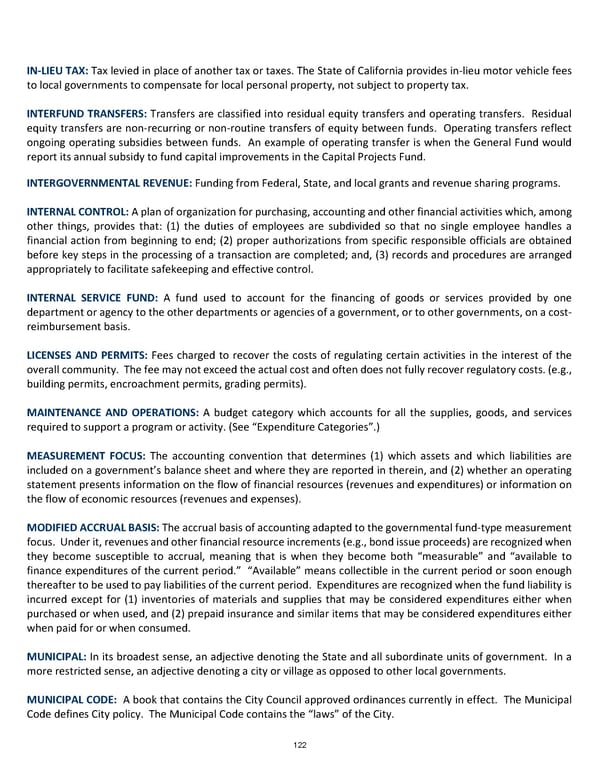IN-LIEU TAX: Tax levied in place of another tax or taxes. The State of California provides in-lieu motor vehicle fees to local governments to compensate for local personal property, not subject to property tax. INTERFUND TRANSFERS: Transfers are classified into residual equity transfers and operating transfers. Residual equity transfers are non-recurring or non-routine transfers of equity between funds. Operating transfers reflect ongoing operating subsidies between funds. An example of operating transfer is when the General Fund would report its annual subsidy to fund capital improvements in the Capital Projects Fund. INTERGOVERNMENTAL REVENUE: Funding from Federal, State, and local grants and revenue sharing programs. INTERNAL CONTROL: A plan of organization for purchasing, accounting and other financial activities which, among other things, provides that: (1) the duties of employees are subdivided so that no single employee handles a financial action from beginning to end; (2) proper authorizations from specific responsible officials are obtained before key steps in the processing of a transaction are completed; and, (3) records and procedures are arranged appropriately to facilitate safekeeping and effective control. INTERNAL SERVICE FUND: A fund used to account for the financing of goods or services provided by one department or agency to the other departments or agencies of a government, or to other governments, on a cost- reimbursement basis. LICENSES AND PERMITS: Fees charged to recover the costs of regulating certain activities in the interest of the overall community. The fee may not exceed the actual cost and often does not fully recover regulatory costs. (e.g., building permits, encroachment permits, grading permits). MAINTENANCE AND OPERATIONS: A budget category which accounts for all the supplies, goods, and services required to support a program or activity. (See “Expenditure Categories”.) MEASUREMENT FOCUS: The accounting convention that determines (1) which assets and which liabilities are included on a government’s balance sheet and where they are reported in therein, and (2) whether an operating statement presents information on the flow of financial resources (revenues and expenditures) or information on the flow of economic resources (revenues and expenses). MODIFIED ACCRUAL BASIS: The accrual basis of accounting adapted to the governmental fund-type measurement focus. Under it, revenues and other financial resource increments (e.g., bond issue proceeds) are recognized when they become susceptible to accrual, meaning that is when they become both “measurable” and “available to finance expenditures of the current period.” “Available” means collectible in the current period or soon enough thereafter to be used to pay liabilities of the current period. Expenditures are recognized when the fund liability is incurred except for (1) inventories of materials and supplies that may be considered expenditures either when purchased or when used, and (2) prepaid insurance and similar items that may be considered expenditures either when paid for or when consumed. MUNICIPAL: In its broadest sense, an adjective denoting the State and all subordinate units of government. In a more restricted sense, an adjective denoting a city or village as opposed to other local governments. MUNICIPAL CODE: A book that contains the City Council approved ordinances currently in effect. The Municipal Code defines City policy. The Municipal Code contains the “laws” of the City. 122
 FY 2024-25 Adopted Operating Budget and Capital Improvement Program Page 136 Page 138
FY 2024-25 Adopted Operating Budget and Capital Improvement Program Page 136 Page 138